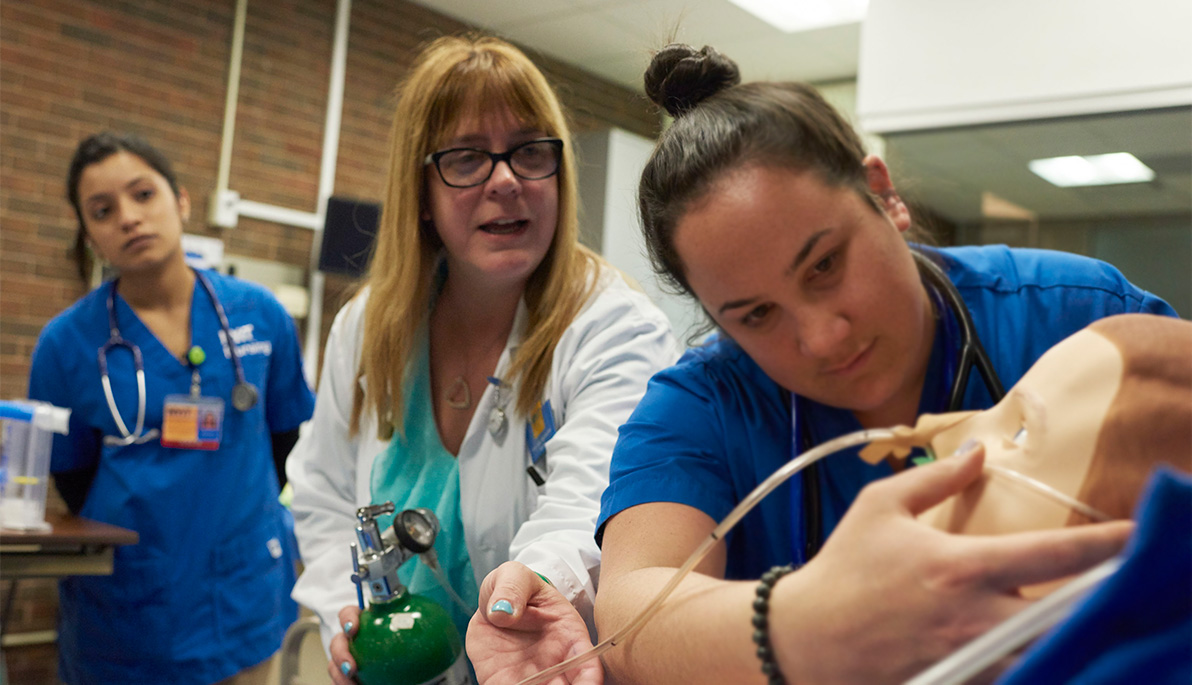News
Q&A: Why Now Is an Opportune Time for Nursing School
January 5, 2021
Pictured: Lisa Sparacino, Ph.D., center, trains future nurses.
The United States is experiencing an increased need for skilled and highly trained nurses. An emphasis on preventive care, rising rates of chronic conditions like diabetes and obesity, and an older generation living longer and more active lives are just some of the many reasons why today’s nurses are in high demand.
The Bureau of Labor Statistics projects that employment demand for registered nurses will grow 12 percent by 2028, a rate that is faster than the average for all occupations. But like any field, nursing is always evolving and rapidly transforming. Advancements in technology, expanding job responsibilities, and a New York State law requiring all nurses to obtain a Baccalaureate Degree in Nursing within 10 years of receiving their initial R.N. license have changed what it means to be a nurse today.
Lisa Sparacino, Ph.D., chair and associate professor of New York Tech’s Nursing, B.S., program sat down with The Box to discuss employment prospects for nursing school graduates.
What career paths are available to a nursing school graduate?
One of the most beautiful aspects of the nursing profession is the numerous areas available for practice. The new graduate nurse is afforded a wide variety of specialties to begin practice. If a particular specialty turns out to not hold the expectations one had at the start, it can be changed, usually very easily or with the acquisition of a few continuing education credits.
What common job titles do nursing school graduates have?
Many new graduate students pick a general medical or surgical unit in an acute care facility as they remain unsure of what path to choose. Many graduates today seek employment in an acute care facility to gain experience while they pursue an advanced degree, such as a nurse practitioner. Yet, there are others, who through past experience or experience gathered in nursing school, enter specialties such as maternal, pediatrics, mental health, community care, home care, or informatics. The list is nearly endless.
How can nursing job prospects vary, particularly for a new graduate?
Having experience as a manager in a healthcare facility hiring new graduates does pose challenges. However, the new graduate is often seen as a person with a clean slate. One that can move from novice to expert, supporting and expanding the philosophy of the institution.
Employers look for the graduate to have a solid GPA, and some require a certain GPA from nursing school. They look for students who passed the NCLEX-RN (the National Council Licensure Examination) on the first try. Students are required to pass pharmacology assessments before they are granted interviews and must demonstrate skill in a high-fidelity simulation experience before being placed in a position.
What employment opportunities differ between someone with an undergraduate vs. graduate nursing degree?
Here in the New York Metropolitan area, the competition for positions as a registered nurse is pretty high. Potential employers look at how their future employees are represented on social media. They also look at the work students have participated in outside of academics, such as volunteering. The New York State “B.S. in 10” law is also active. Most acute care facilities will not hire a nurse with an associate’s degree unless they indicate that they are already in an R.N. completion program.
Graduates of New York Tech’s nursing program have obtained positions as hospital nurses, health educators, and more. Notable employers include Catholic Health Services of Long Island, Mount Sinai Health System, Northwell Health, NYC Health + Hospitals, and St. Barnabas Hospital among others.
This interview has been edited and condensed.





